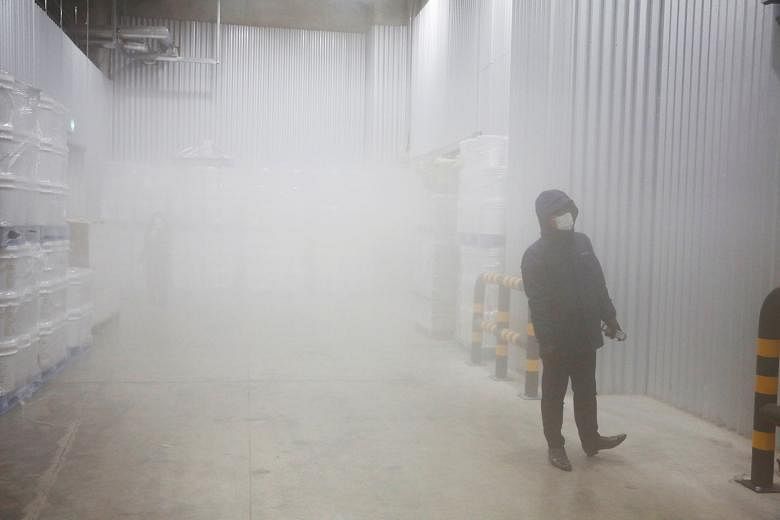SEOUL/PYEONGTAEK • South Korea will mobilise military forces in its capital Seoul to help front-line health workers deal with a surge in coronavirus infections, as 689 new cases were reported yesterday and the death toll and number of patients in critical care rose.
Of the new cases, 673 were locally transmitted, which brings the country's tally to 40,786, the Korea Disease Control and Prevention Agency (KDCA) said.
The death toll increased by eight to 572 deaths, KDCA reported.
The surge in cases has delivered a blow to South Korea's vaunted pandemic-fighting system, which successfully used invasive tracing, testing and quarantines to avoid lockdowns and blunt previous waves, and keep infections below 50 a day for much of the summer.
The authorities scrambled to set up hospital beds in shipping containers this week to ease the strain on medical facilities stretched by the latest coronavirus wave.
The number of patients in serious or severe condition has grown to nearly 170, prompting the health authorities to seek more beds nationwide.
Calling the current wave a critical crisis, Prime Minister Chung Sye-kyun said he will dispatch around 800 military, police and government workers in every district of the greater Seoul area to help track down potential patients.
Front-line workers and medical staff are struggling each day to conduct endless epidemiological investigations as well as with testing, and securing sufficient beds, as confirmed cases grow in various areas, including the metropolitan Seoul area, Mr Chung told a government meeting yesterday.
"In the end, in order to tamp down this wave, it is key to seize the victory in virus-prevention efforts in the greater Seoul area," said Mr Chung.
The majority of the new cases have been reported in the capital city of Seoul, the neighbouring port city of Incheon, and Gyeonggi province, which is home to 13.5 million people and surrounds both cities.
Meanwhile, the KDCA has been in talks with Korea Superfreeze, a cold storage logistics company, for a contract to store Covid-19 vaccines.
Company chief executive Kim Jin-ha said some rooms in its coldest warehouse are so frigid that a cup of warm water thrown into any of them will immediately turn into snow.
Located 65km south of Seoul and boasting temperatures frostier than an Antarctic winter, the facility would be the best, perhaps only, place in the country suitable for bulk storage of Pfizer's coronavirus vaccine, which needs to be stored at minus 70 deg C.
"As soon as we heard about the Pfizer vaccine, we started getting ready... other options wouldn't work," Mr Kim told Reuters, adding that the warehouse's use of liquefied natural gas to keep temperatures down trumped electricity.
The company has been in talks with the KDCA since last month. While nothing is set in stone, expectations are high that it will land a contract.
The agency has asked Korea Superfreeze - which is backed by Goldman Sachs and SK Holdings - to provide plans and cost estimates for storing and distributing vaccines, including how it would handle a scenario where vaccines would be shipped to 260 different locations, Mr Kim said.
South Korea has arranged to buy 20 million doses of the vaccine developed by Pfizer and its German partner BioNTech.
-
800
-
Estimated number of military, police and government workers who will be dispatched in every district of the greater Seoul area to help track down potential patients.
The country also has deals for 20 million doses each of the vaccines developed by Moderna and AstraZeneca/Oxford University and another four million doses from Johnson & Johnson.
The shipments are expected to arrive no later than next March.
Mr Kim said it was not clear to him if the agency would tap the company for vaccines other than Pfizer's that have less onerous cold storage requirements. Moderna's vaccine can be stored for up to six months at minus 20 deg C, while AstraZeneca's needs only normal fridge temperatures.
To accommodate Pfizer's vaccine, Korea Superfreeze is planning a dedicated passageway and elevator so there is no interference from outside temperatures. Once it confirms it has a contract, it will begin construction, which may take two to three months.
REUTERS

